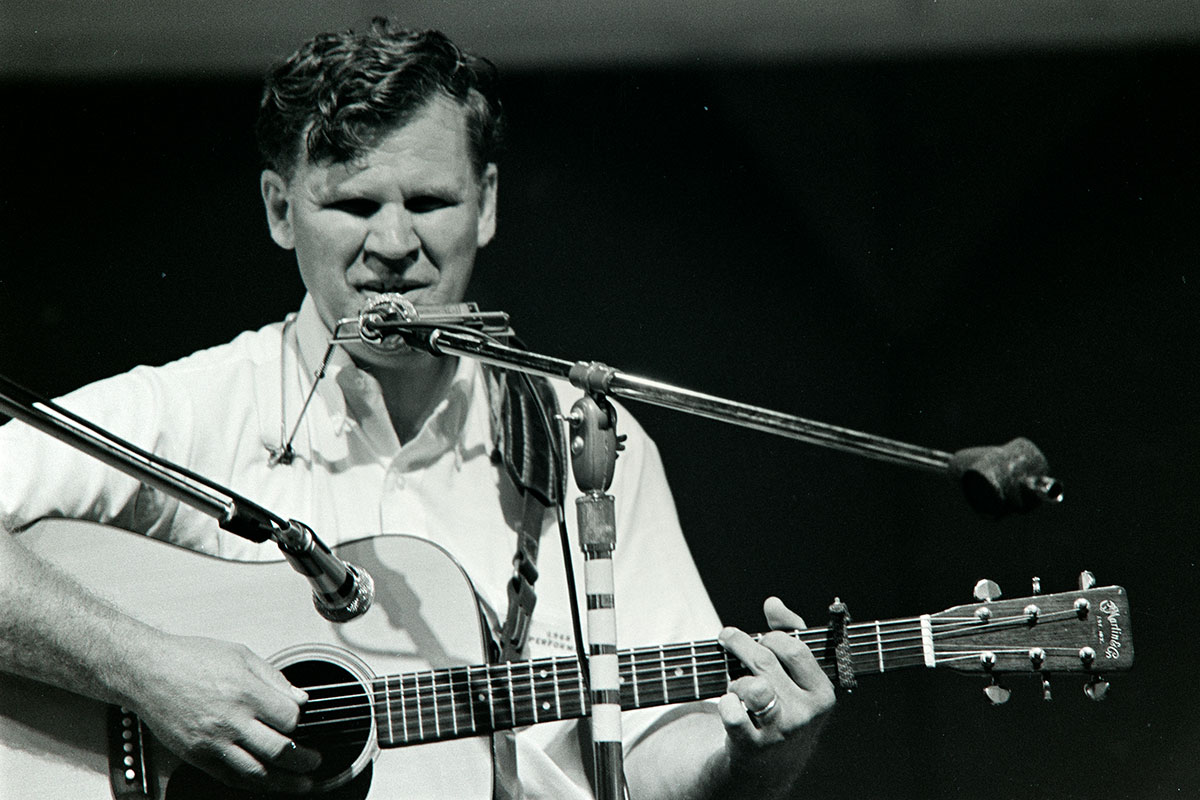Folk and bluegrass music pioneer Doc Watson wasn’t exactly a futurist, but he knew the livelihood of American roots music would rest in the hands of those who challenged it and brought new ideas to the circle.
Watson was listening with open ears when Bill Monroe and Flatt & Scruggs popularized bluegrass music in the 1940s, when the acoustic guitar was an accompaniment instrument to fiddle, mandolin, and banjo. In the hands of Watson—who died in 2012 at age eighty-nine and would have notched his centennial birthday in March—it became a soloist’s instrument and a canvas for his flatpicking guitar work.
Although Watson’s music spanned the gulf of traditional American styles that comprise what is known today as Americana, when pressed to define his own music, he simply called it “traditional plus.”
“He didn’t want to be pigeonholed,” says his longtime friend Frederick “B” Townes.
Nowhere was his open-door philosophy more on display than at MerleFest, the roots-music festival he co-founded with Townes, which will present its thirty-fifth installment April 27 to 30 at Wilkes Community College in Wilkesboro, North Carolina.

“From the very beginning, we had the Smith Sisters playing Irish music,” Townes says of MerleFest’s history. “We had New Grass Revival playing progressive bluegrass, and others playing traditional bluegrass. We had Chet Atkins playing fingerstyle guitar. We had David Holt playing old-time music. From a programming point of view, from the get-go we had every kind of music.”
It’s not difficult, then, to connect the mainstream success enjoyed today by bluegrass-rooted artists like Billy Strings, who is currently playing sports arenas and amphitheaters, and Tyler Childers and Sturgill Simpson, who recently released back-to-bluegrass records at the height of their careers, to Watson and the big tent he created at MerleFest.
Born in 1923 in Deep Gap, North Carolina, Watson lost his eyesight before his second birthday but proved a self-taught musical wunderkind who was able to relate the music he heard in the Blue Ridge Mountains to chords and notes on the guitar.
“By listening to the old records, after you got familiarized with the instrument, you could hear what strings they were hitting and what chords they were playing just by the sound,” Watson told NPR’s Terry Gross in 1988.
Watson spent the 1950s playing rockabilly music on an electric guitar, then joined the folk-music movement in the 1960s, with guidance from future Smithsonian Folklife Festival co-founder Ralph Rinzler, and turned in a career-defining performance at the 1963 Newport Folk Festival. That same year, he released his first commercial album—a live concert recording with Appalachian dulcimer player Jean Ritchie—on Folkways Records. The following year, his son, Eddy Merle, joined Watson as a member of his group, and the father-son duo played together until Merle died in a farm accident in 1985.


Watson and Townes collaborated on MerleFest, established as a fundraiser to support the Wilkes Community College horticulture program and named in tribute to Watson’s late son. At the 2023 event, headliners Maren Morris, The Black Crowes, The Avett Brothers, and Nickel Creek represent the mainstream, while the typically strong undercard will feature more adventurous artists like the Tejon Street Corner Thieves and Yasmin Williams.
Traditionalist Dom Flemons, who impressed Watson as a member of the Carolina Chocolate Drops at the 2007 edition of MerleFest—so much that he asked them back in 2008 and 2009—will perform a solo set. Flemons shares Watson’s musical spirit, internalizing bluegrass and other traditional forms in a similar manner. It’s easy to hear the bluegrass influence on “We Are Almost Down to the Shore” and “Saddle It Around,” two standouts on his 2023 Smithsonian Folkways album, Traveling Wildfire.
Throughout the event, musicians and filmmakers will celebrate what would have been Watson’s hundredth birthday, including a birthday jam hosted by the Kruger Brothers and a screening of the documentary My Name Is Merle. And while not part of MerleFest, it’s worth noting I Am a Pilgrim: Doc Watson at 100, a tribute album out April 28, features interpretations from country and Americana artists like Dolly Parton, Jerry Douglas, and Steve Earle.
“There really aren’t any limits—our doors are open at MerleFest, and Doc’s eyes and ears were open to all types,” Townes says. “Just think about the jazz influence of Béla Fleck and the Flecktones. Early on, that was pushing the limits, and Doc was accepting of it. I think those types of tangents that come out of MerleFest have shown others that it’s okay to present different types of music and have an appreciation of the different genres.”
Jim Beaugez has written about traditional and contemporary American music for Rolling Stone, Smithsonian, Oxford American, Garden & Gun, and other media outlets. He has also contributed to the Grammy Awards and created and produced My Life in Five Riffs, a documentary series for Guitar Player that traces musicians back to their sources of inspiration.





